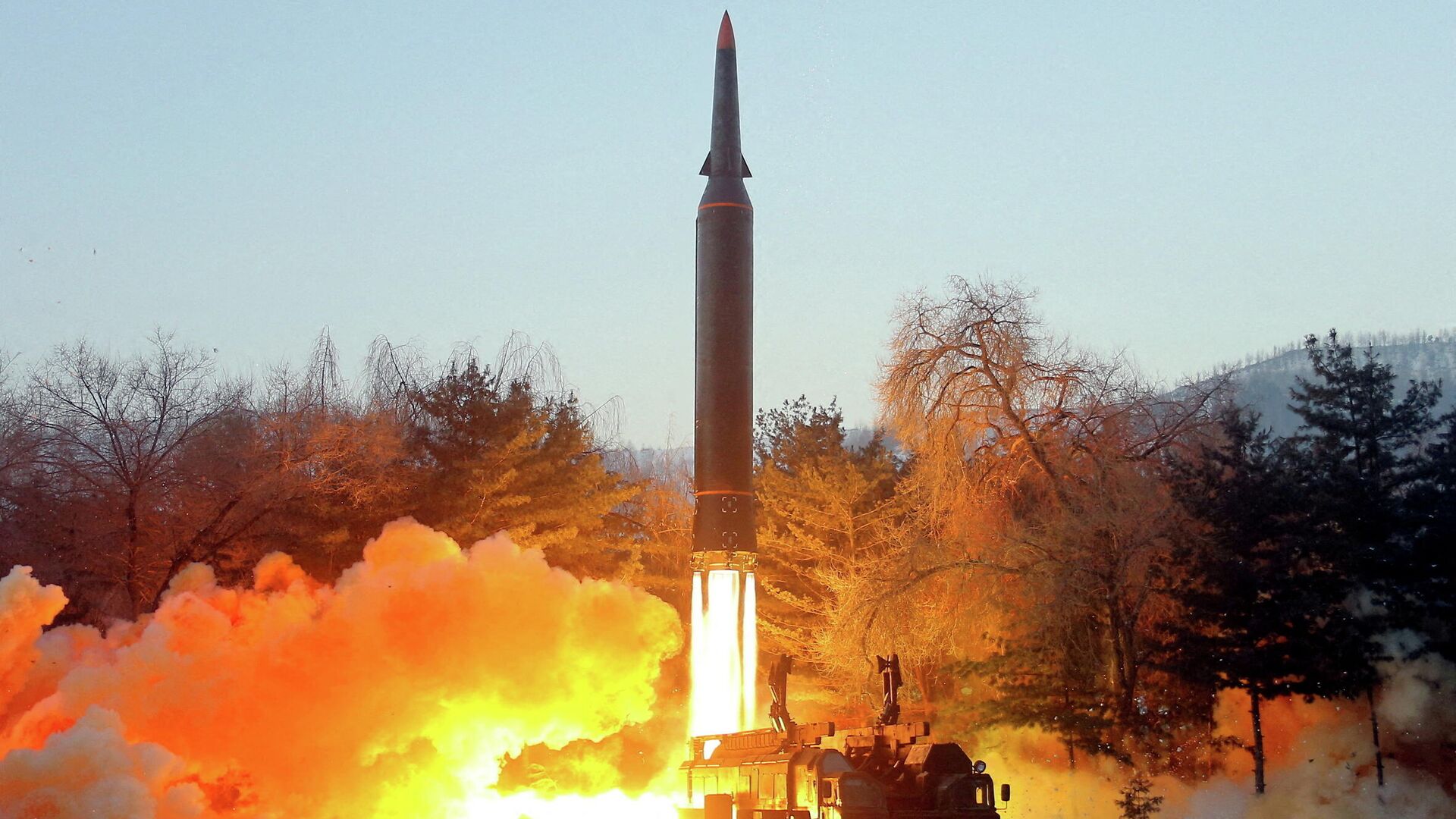https://sputnikglobe.com/20220111/north-korea-launched-hypersonic-missile-during-tuesday-launch-attended-by-kim-jong-un-1092188343.html
North Korea Successfully Fired Hypersonic Missile During Tuesday Launch Attended by Kim Jong Un
North Korea Successfully Fired Hypersonic Missile During Tuesday Launch Attended by Kim Jong Un
Sputnik International
North Korea's Tuesday missile test was of a Hwasong-8 hypersonic missile, state media said on Wednesday morning, noting the test was personally observed by Kim Jong Un, chairman of the country's Central Military Commission.
2022-01-11T21:08+0000
2022-01-11T21:08+0000
2023-09-18T13:36+0000
kim jong un
missile
hypersonic
north korea
https://cdn1.img.sputnikglobe.com/img/07e6/01/0b/1092172435_0:70:2362:1399_1920x0_80_0_0_50f6350f495a419ab1c8126fc5c5a9e1.jpg
The Tuesday test was the second in less than a week by the Democratic People's Republic of Korea (DPRK) and third overall of a hypersonic weapon. According to the South Korean Joints Chiefs of Staff, which tracked the missile's launch and flight, it flew more than 700 kilometers across the Sea of Japan and reached an altitude of 60 kilometers while reaching a speed of Mach 10, or more than 7,600 miles per hour.According to Korean Central News Agency (KCNA), the missile actually flew 1,000 kilometers, including 600-kilometer "glide jump flight," and accurately struck its target.The Japanese Coast Guard said the missile landed in international waters and caused no damage. However, Tokyo condemned the test, saying the DPRK's actions "pose a threat to the peace and security of our country, the broader region, and the entire international community."The US also condemned the launch, accusing Pyongyang of violating UN Security Council resolutions.During the previous test on January 4, the DPRK said it successfully tested the rocket engine's functioning in winter conditions, as well as the hypersonic glide vehicle's ability to maneuver after detaching from the rocket - an ability that renders it virtually impervious to interception. However, that test only reached a speed of Mach 6, or six times the speed of sound.The DPRK has been at war with South Korea and the US since 1950, when the US intervened in a Korean civil war. The fighting ended in 1953 with a ceasefire and the establishment of the demilitarized zone, but no permanent peace treaty has ever been signed and 28,500 US troops have continued to garrison South Korea. North Korea says it needs its ballistic missiles and nuclear weapons to guarantee its security in the absence of a peace treaty and US withdrawal.
north korea
Sputnik International
feedback@sputniknews.com
+74956456601
MIA „Rossiya Segodnya“
2022
News
en_EN
Sputnik International
feedback@sputniknews.com
+74956456601
MIA „Rossiya Segodnya“
Sputnik International
feedback@sputniknews.com
+74956456601
MIA „Rossiya Segodnya“
dprk; hypersonic missile; test; hwasong-8; kim jong un
dprk; hypersonic missile; test; hwasong-8; kim jong un
North Korea Successfully Fired Hypersonic Missile During Tuesday Launch Attended by Kim Jong Un
21:08 GMT 11.01.2022 (Updated: 13:36 GMT 18.09.2023) North Korea's Tuesday missile test was of a Hwasong-8 hypersonic missile, state media said on Wednesday morning, noting the test was personally observed by Kim Jong Un, chairman of the country's Central Military Commission.
The
Tuesday test was the second in less than a week by the Democratic People's Republic of Korea (DPRK) and third overall of a hypersonic weapon.
According to the South Korean Joints Chiefs of Staff, which tracked the missile's launch and flight, it flew more than 700 kilometers across the Sea of Japan and reached an altitude of 60 kilometers while reaching a speed of Mach 10, or more than 7,600 miles per hour.
According to Korean Central News Agency (KCNA), the missile actually flew 1,000 kilometers, including 600-kilometer "glide jump flight," and accurately struck its target.
"The test-fire was aimed at the final verification of overall technical specifications of the developed hypersonic weapon system," KCNA said on Wednesday. "The superior maneuverability of the hypersonic glide vehicle was more strikingly verified through the final test-fire."
The Japanese Coast Guard said the missile landed in international waters and caused no damage. However,
Tokyo condemned the test, saying the DPRK's actions "pose a threat to the peace and security of our country, the broader region, and the entire international community."
The US also
condemned the launch, accusing Pyongyang of violating UN Security Council resolutions.
During
the previous test on January 4, the DPRK said it successfully tested the rocket engine's functioning in winter conditions, as well as the hypersonic glide vehicle's ability to maneuver after detaching from the rocket - an ability that renders it virtually impervious to interception. However, that test only reached a speed of Mach 6, or six times the speed of sound.
The first test,
in late September, demonstrated the basics of the projectile's flight but came as the DPRK's chief envoy to the United Nations was speaking at the General Assembly, asserting the country's right to defend itself as well as its willingness to engage in peace talks.
The DPRK has been at war with South Korea and the US since 1950, when the US intervened in a Korean civil war. The fighting ended in 1953 with a ceasefire and the establishment of the demilitarized zone, but no permanent peace treaty has ever been signed and 28,500 US troops have continued to garrison South Korea. North Korea says it needs its ballistic missiles and nuclear weapons to guarantee its security in the absence of a peace treaty and US withdrawal.

